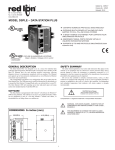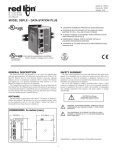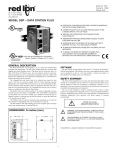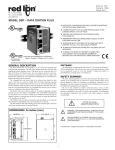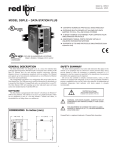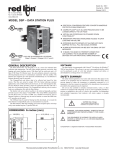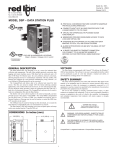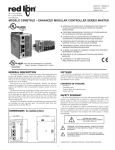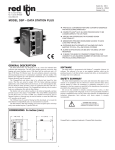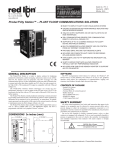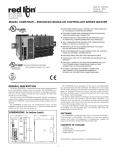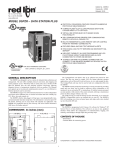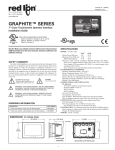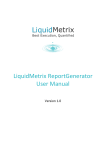Download DSPLE Data Station Plus Data Sheet/Manual PDF
Transcript
Bulletin No. DSPLE-C Drawing No. LP0671 Released 03/09 Tel +1 (717) 767-6511 Fax +1 (717) 764-0839 www.redlion.net MODEL DSPLE – DATA STATION PLUS C UL R CONVERTS NUMEROUS PROTOCOLS SIMULTANEOUSLY US LISTED EXTENSIVE BUILT-IN DRIVER LIST ALLOWS EASY DATA MAPPING TO PLCs, PCs, AND SCADA SYSTEMS IND. CONT. EQ. 34AD 10 BASE-T/100BASE-TX ETHERNET PORT SUPPORTS FOUR SIMULTANEOUS PROTOCOLS INDEPENDENT SERIAL PORTS PROVIDE VIRTUALLY UNLIMITED INTEGRATION METHODS SUPPORTS UP TO NINE PROTOCOLS SIMULTANEOUSLY(with expansion card) 3PWL PROGRAMMABLE CONTROLLERS FOR USE IN HAZARDOUS LOCATIONS: Class I, Division 2, Groups A, B, C, and D GENERAL DESCRIPTION SAFETY SUMMARY The Data Station Plus was designed to act as a nexus for industrial data collection and management. With three built in serial ports and a 10 Base-T/100 Base-TX Ethernet port, the unit performs protocol conversion, allowing disparate devices to communicate seamlessly with one another. The Ethernet port supports up to four protocols simultaneously so even Ethernet to Ethernet conversion may be performed. The CompactFlash card allows new configuration files to be loaded into the Data Station Plus. The USB port may be used for blazing fast file downloads, or to mount the Data Station’s CompactFlash card as an external drive to your PC. The Data Station’s DIN rail mounting saves time and panel space and snaps easily onto standard top hat (T) profile DIN rail. All safety related regulations, local codes and instructions that appear in the manual or on equipment must be observed to ensure personal safety and to prevent damage to either the instrument or equipment connected to it. If equipment is used in a manner not specified by the manufacturer, the protection provided by the equipment may be impaired. Do not use the controller to directly command motors, valves, or other actuators not equipped with safeguards. To do so can be potentially harmful to persons or equipment in the event of a fault to the controller. An independent and redundant temperature limit indicator with alarm outputs is strongly recommended. SOFTWARE CAUTION: Risk of Danger. Read complete instructions prior to installation and operation of the unit. The Data Station is programmed with Crimson® 2.0 software for Windows® 2000 or later platforms. The software is an easy to use graphical interface which can be purchased as part of a kit that includes a manual and cables, or downloaded free of charge from www.redlion.net. WARNING - EXPLOSION HAZARD - SUBSTITUTION OF COMPONENTS MAY IMPAIR SUITABILITY FOR CLASS I, DIVISION 2 THIS EQUIPMENT IS SUITABLE FOR USE IN CLASS I, DIVISION 2, GROUPS A, B, C, D, OR NON-HAZARDOUS LOCATIONS ONLY DIMENSIONS In inches (mm) CompactFlash is a registered trademark of CompactFlash Association. 1 SPECIFICATIONS 7. CONSTRUCTION: Case body is burgundy high impact plastic and stainless steel. Installation Category I, Pollution Degree 2. 8. POWER CONNECTION: Removable wire clamp screw terminal block. Wire Gage Capacity: 24 AWG to 12 AWG Torque: 4.45 to 5.34 in/lb (0.5 to 0.6 N-m) 9. MOUNTING: Snaps onto standard DIN style top hat (T) profile mounting rails according to EN50022 -35 x 7.5 and -35 x 15. 10. CERTIFICATIONS AND COMPLIANCES: SAFETY UL Listed, File #E302106, UL508, CSA 22.2 No. 14-M05 LISTED by Und. Lab. Inc. to U.S. and Canadian safety standards UL Listed, File #E317425, ANSI/ISA 12.12.01-2007, CSA 22.2 No. 213-M1987 LISTED by Und. Lab. Inc. to U.S. and Canadian safety standards IEC 61010-1, EN 61010-1: Safety requirements for electrical equipment for measurement, control, and laboratory use, Part 1. ELECTROMAGNETIC COMPATIBILITY Emissions and Immunity to EN 61326: 2006: Electrical Equipment for Measurement, Control and Laboratory use. Immunity to Industrial Locations: Electrostatic discharge EN 61000-4-2 Criterion B 4 kV contact discharge 8 kV air discharge Electromagnetic RF fields EN 61000-4-3 Criterion A 10 V/m Fast transients (burst) EN 61000-4-4 Criterion A power 2 kV I/O signal 1 kV Surge EN 61000-4-5 Criterion B power 1kV L-L,2 kV L-G signal 1kV RF conducted interference EN 61000-4-6 Criterion A 3 V/rms Emissions: Emissions EN 55011 Class A 1. POWER: 24 VDC ± 10% 200 mA min., without expansion card 1 Amp maximum with expansion card fitted Must use Class 2 or SELV rated power supply. 2. COMMUNICATIONS: USB/PG Port: Adheres to USB specification 1.1. Device only using Type B connection. WARNING - DO NOT CONNECT OR DISCONNECT CABLES WHILE POWER IS APPLIED UNLESS AREA IS KNOWN TO BE NON-HAZARDOUS. USB PORT IS FOR SYSTEM SET-UP AND DIAGNOSTICS AND IS NOT INTENDED FOR PERMANENT CONNECTION. Serial Ports: Format and Baud Rates for each port are individually software programmable up to 115,200 baud. RS232/PG Port: RS232 port via RJ12 COMMS Ports: RS422/485 port via RJ45, and RS232 port via RJ12 DH485 TXEN: Transmit enable; open collector, VOH = 15 VDC, VOL = 0.5 V @ 25 mA max. Ethernet Port: 10 BASE-T / 100 BASE-TX RJ45 jack is wired as a NIC (Network Interface Card). 3. LEDs: STS – Status LED indicates condition of Data Station. TX/RX – Transmit/Receive LEDs show serial activity. Ethernet – Link and activity LEDs. CF – CompactFlash LED indicates card status and read/write activity 4. MEMORY: On-board User Memory: 4 Mbytes of non-volatile Flash memory. On-board SDRAM: 2 Mbytes Memory Card: CompactFlash Type II slot for Type I and Type II cards. Used for optional database storage only 5. REAL-TIME CLOCK: Typical accuracy is less than one minute per month drift. Battery: Lithium Coin Cell. Typical lifetime of 10 years at 25 ºC. A “Battery Low” system variable is available so that the programmer can choose specific action(s) to occur when the battery voltage drops below its nominal voltage. This unit is NOT field serviceable. All work must be done by a qualified technician. 6. ENVIRONMENTAL CONDITIONS: Operating Temperature Range: 0 to 50°C Storage Temperature Range: -30 to +70°C Operating and Storage Humidity: 80% max relative humidity, non-condensing, from 0 to 50°C Vibration According to IEC 68-2-6: Operational 5 to 150 Hz, in X, Y, Z direction for 1.5 hours, 2 g’s. Shock According to IEC 68-2-27: Operational 30 g, 11 msec in 3 directions. Altitude: Up to 2000 meters Notes: 1. Criterion A: Normal operation within specified limits. 2. Criterion B: Temporary loss of performance from which the unit selfrecovers. 11. WEIGHT: 15.1 oz (456.4 g) WARNING - EXPLOSION HAZARD - DO NOT DISCONNECT EQUIPMENT UNLESS POWER HAS BEEN SWITCHED OFF OR AREA IS KNOWN TO BE NON-HAZARDOUS. HARDWARE INSTALLATION DIN rail should be mounted horizontally so that the unit’s ventilation holes are vertical in relation to cabinet orientation. A minimum clearance of 1 inch (25.4 mm) should be maintained above and below the unit in order to ensure proper thermal regulation. Figure 1 - Attach Data Station To DIN Rail 2 POWER SUPPLY REQUIREMENTS COMPACTFLASH® CARD It is very important that the power supply is mounted correctly if the unit is to operate reliably. Please take care to observe the following points: – The power supply must be mounted close to the unit, with usually not more than 6 feet (1.8 m) of cable between the supply and the Data Station. Ideally, the shortest length possible should be used. – The wire used to connect the Data Station’s power supply should be at least 22-gage wire. If a longer cable run is used, a heavier gage wire should be used. The routing of the cable should be kept away from large contactors, inverters, and other devices which may generate significant electrical noise. – A power supply with a Class 2 or SELV rating is to be used. A Class 2 or SELV power supply provides isolation to accessible circuits from hazardous voltage levels generated by a mains power supply due to single faults. SELV is an acronym for “safety extra-low voltage.” Safety extralow voltage circuits shall exhibit voltages safe to touch both under normal operating conditions and after a single fault, such as a breakdown of a layer of basic insulation or after the failure of a single component has occurred. CompactFlash socket is a Type II socket that can accept either Type I or II cards. Use cards with a minimum of 4 Mbytes and a maximum of 2 Gbytes with the Data Station’s CompactFlash socket. Cards are available at most computer and office supply retailers. The CompactFlash can be used for optional database storage only. Visit www.redlion.net for a complete list of our PSDR Series of Class 2 power supplies. Note: Do not remove or insert the CompactFlash card while power is applied. Information stored on a CompactFlash card can be read by a card reader attached to a PC. This information is stored in IBM (Windows®) PC compatible FAT16 file format. NOTE For reliable operation in all of our products, Red Lion recommends the use of SanDisk®, SimpleTech, and SMART® brands of CompactFlash cards. Industrial grade versions that provide up to two million write/erase cycles minimum are available from Red Lion. EMC INSTALLATION GUIDELINES Although Red Lion Controls Products are designed with a high degree of immunity to Electromagnetic Interference (EMI), proper installation and wiring methods must be followed to ensure compatibility in each application. The type of the electrical noise, source or coupling method into a unit may be different for various installations. Cable length, routing, and shield termination are very important and can mean the difference between a successful or troublesome installation. Listed are some EMI guidelines for a successful installation in an industrial environment. 4. Never run Signal or Control cables in the same conduit or raceway with AC power lines, conductors feeding motors, solenoids, SCR controls, and heaters, etc. The cables should be run through metal conduit that is properly grounded. This is especially useful in applications where cable runs are long and portable two-way radios are used in close proximity or if the installation is near a commercial radio transmitter. Also, Signal or Control cables within an enclosure should be routed as far away as possible from contactors, control relays, transformers, and other noisy components. 5. Long cable runs are more susceptible to EMI pickup than short cable runs. Therefore, keep cable runs as short as possible. 6. In extremely high EMI environments, the use of external EMI suppression devices is effective. The following EMI suppression devices (or equivalent) are recommended: Ferrite Suppression Cores for signal and control cables: Fair-Rite part number 0443167251 (RLC part number FCOR0000) TDK part number ZCAT3035-1330A Steward part number 28B2029-0A0 Line Filters for input power cables: Schaffner part number FN610-1/07 (RLC part number LFIL0000) Schaffner part number FN670-1.8/07 Corcom part number 1 VR3 Visit RLC's web site at www.redlion.net for more information on EMI guidelines, Safety and CE issues as they relate to Red Lion Controls products. 1. To reduce the chance of noise spikes entering the unit via the power lines, connections should be made to a clean source. Connecting to circuits that also power loads such as contactors, relays, motors, solenoids etc. should be avoided. 2. The unit should be mounted in a metal enclosure, which is properly connected to protective earth. 3. Use shielded (screened) cables for all Signal and Control inputs. The shield (screen) pigtail connection should be made as short as possible. The connection point for the shield depends somewhat upon the application. Listed below are the recommended methods of connecting the shield, in order of their effectiveness. a. Connect the shield to earth ground (protective earth) at one end where the unit is mounted. b. Connect the shield to earth ground at both ends of the cable, usually when the noise source frequency is over 1 MHz. c. Connect the shield to common of the Data Station and leave the other end of the shield unconnected and insulated from earth ground. 3 WIRING POWER CONNECTION WARNING - EXPLOSION HAZARD - DO NOT DISCONNECT WHILE CIRCUIT IS ALIVE UNLESS AREA IS KNOW TO BE NON-HAZARDOUS. INPUT AND OUTPUT (I/O) WIRING MUST BE IN ACCORDANCE WITH CLASS I, DIV. 2 WIRING METHODS AND IN ACCORDANCE WITH THE AUTHORITY HAVING JURISDICTION. PROGRAMMING PORTS RS232/PG USB/PG ETHERNET COMMUNICATION PORTS RS232/PG 4 RS232 * Use appropriate communications cable. See Ordering Information for descriptions of the available cables. RS485 WARNING: Do NOT use a standard DH-485 cable to connect this port to Allen Bradley equipment. PORT 3 - ETHERNET CONNECTION Standard Ethernet cable DATA STATION PORT PIN OUTS TROUBLESHOOTING If for any reason you have trouble operating, connecting, or simply have questions concerning your new Data Station, contact Red Lion’s technical support. For contact information, refer to the back page of this bulletin for phone and fax numbers. EMAIL: [email protected] Web Site: http://www.redlion.net 5 COMMUNICATING WITH THE DATA STATION CONFIGURING A DATA STATION RS232 PORTS The Data Station is configured using Crimson® 2.0 software. Crimson 2.0 is available as a free download from Red Lion’s website, or it can be ordered on CD. Updates the software for new features and drivers are posted on the website as they become available. By configuring the Data Station using the latest version of the software, you are assured that your unit has the most up to date feature set. Crimson® 2.0 software can configure the Data Station through the RS232/PG port, USB/PG port, Ethernet, or CompactFlash. The USB/PG port is connected using a standard USB cable with a Type B connector. The driver needed to use the USB port will be installed with Crimson 2.0. The RS232/PG port uses a programming cable made by Red Lion to connect to the DB9 COM port of your computer. If making your own cable, refer to the “Data Station Port Pin Outs” for wiring information. The CompactFlash can be used to program a Data Station by placing a configuration file and firmware on the CompactFlash card. The card is then inserted into the target Data Station and powered. Refer to the Crimson® 2.0 literature for more information on the proper names and locations of the files. The Data Station has two RS232 ports. There is the RS232/PG port and the COMMS port. Although only one of these ports can be used for programming, both ports can be used for communications with a PLC. The RS232/PG port can be used for either master or slave protocols. RS422/485 PORT The Data Station has one RS422/485 port. This port can be configured to act as either RS422 or RS485. RS422/485 4-WIRE CONNECTIONS RS485 2-WIRE CONNECTIONS CABLES AND DRIVERS Red Lion has a wide range of cables and drivers for use with many different communication types. A list of these drivers and cables along with pin outs is available from Red Lion’s website. New cables and drivers are added on a regular basis. If making your own cable, refer to the “Data Station Port Pin Outs” for wiring information. USB, DATA TRANSFERS FROM THE COMPACTFLASH CARD WARNING - DO NOT CONNECT OR DISCONNECT CABLES WHILE POWER IS APPLIED UNLESS AREA IS KNOWN TO BE NON-HAZARDOUS. USB PORT IS FOR SYSTEM SET-UP AND DIAGNOSTICS AND IS NOT INTENDED FOR PERMANENT CONNECTION. Note: All Red Lion® devices connect A to A and B to B, except for Paradigm devices. Refer to www.redlion.net for additional information. In order to transfer data from the CompactFlash card via the USB port, a driver must be installed on your computer. This driver is installed with Crimson 2.0 and is located in the folder C:\Program Files\Red Lion Controls\Crimson 2.0\Device\ after Crimson 2.0 is installed. This may have already been accomplished if your Data Station was configured using the USB port. Once the driver is installed, connect the Data Station to your PC with a USB cable, and follow “Mounting the CompactFlash” instructions in the Crimson 2.0 user manual. DH485 COMMUNICATIONS The Data Station’s RS422/485 COMMS port can also be used for Allen Bradley DH485 communications. WARNING: DO NOT use a standard DH485 cable to connect this port to Allen Bradley equipment. A cable and wiring diagram are available from Red Lion. Note: The USB port is for system set-up and diagnostics and is not intended for permanent connection. ETHERNET COMMUNICATIONS Ethernet communications can be established at either 10 BASE-T or 100 BASE-TX. The Data Station’s RJ45 jack is wired as a NIC (Network Interface Card). For example, when wiring to a hub or switch use a straight-through cable, but when connecting to another NIC use a crossover cable. The Crimson 2.0 manual contains additional information on Ethernet communications. 6 LEDS USER COMMUNICATION PORTS - TX/RX LEDS STS – STATUS LED The green Status LED provides information regarding the state of the Data Station. This includes indication of the various stages of the start-up routine (power-up), and any errors that may occur. LED INDICATION GREEN Transmitting RED Receiving Note: LEDs are not available on the Programming Port: RS232/PG. Startup Routine INDICATION Rapidly Flashing Data Station is currently running the boot loader and/or being flash upgraded by Crimson. Steady Data Station is operating properly. ETHERNET LEDS CF – COMPACTFLASH LED LED INDICATION Off No CompactFlash Card is present. Steady Valid CompactFlash card is present. Flashing Rapidly CompactFlash card is being checked. Flickering Unit is writing to the CompactFlash, either because it is storing data, or because the PC connected via the USB port has locked the drive. 1 Flashing Slowly Incorrectly formatted CompactFlash card present. LED INDICATION YELLOW (Solid) Link Established YELLOW (Flashing) Network Activity GREEN 10 BASE-T Communications AMBER 100 BASE-TX Communications 1. Do not turn off power to the unit while this light is flickering. The unit writes data in two minute intervals. Later Microsoft operating systems will not lock the drive unless they need to write data; Windows 98 may lock the drive any time it is mounted, thereby interfering with logging. Refer to “Mounting the CompactFlash” in the Crimson 2.0 User Manual. ORDERING INFORMATION TYPE Data Station Plus Communications Cables (10 feet) MODEL NO. DSP CBL DESCRIPTION PART NUMBER Data Station with multiple protocol converter, Comms, Ethernet and expansion slot. DSPLE000 Data Station with multiple protocol converter, data logger, web server with Virtual HMI up to QVGA (320 x 240) and expansion slot. DSPSX000 Data Station with multiple protocol converter, data logger, web server with Virtual HMI up to VGA (640 x 480) size and expansion slot with increased SDRAM. DSPGT000 RS-232 Programming Cable CBLPROG0 USB Cable CBLUSB00 Communications Cables Software Power Supply Accessories SFCRM2 1 CBLxxxxx Crimson® 2.0 2, Manual and Download Cable SFCRM200 PSDR DIN Rail Power Supply PSDRxxxx XCCN CANopen option card for Modular Controller or Data Station Plus XCCN0000 XCDN DeviceNet option card for Modular Controller or Data Station Plus XCDN0000 XCPB PROFIBUS option card for Modular Controller or Data Station Plus XCPBDP00 XCRS0000 XCRS RS232/485 option card for Modular Controller or Data Station Plus Accessories G3CF CompactFlash Card Accessories DR 4 DIN Rail Mountable Adapter Products G3CFxxxx 3 DRxxxxxx 1 Visit www.redlion.net for a list of communication drivers and cables. 2 Use this part number to purchase the Crimson® software on CD with a printed manual, USB cable, and RS-232 cable. Otherwise, download free of charge from www.redlion.net. 3 Red Lion offers RJ modular jack adapters. Refer to the DR literature for complete details. 4 Industrial grade two million write cycles. 7 LIMITED WARRANTY The Company warrants the products it manufactures against defects in materials and workmanship for a period limited to two years from the date of shipment, provided the products have been stored, handled, installed, and used under proper conditions. The Company’s liability under this limited warranty shall extend only to the repair or replacement of a defective product, at The Company’s option. The Company disclaims all liability for any affirmation, promise or representation with respect to the products. The customer agrees to hold Red Lion Controls harmless from, defend, and indemnify RLC against damages, claims, and expenses arising out of subsequent sales of RLC products or products containing components manufactured by RLC and based upon personal injuries, deaths, property damage, lost profits, and other matters which Buyer, its employees, or sub-contractors are or may be to any extent liable, including without limitation penalties imposed by the Consumer Product Safety Act (P.L. 92-573) and liability imposed upon any person pursuant to the Magnuson-Moss Warranty Act (P.L. 93-637), as now in effect or as amended hereafter. No warranties expressed or implied are created with respect to The Company’s products except those expressly contained herein. The Customer acknowledges the disclaimers and limitations contained herein and relies on no other warranties or affirmations. Red Lion Controls Headquarters 20 Willow Springs Circle York PA 17406 Tel +1 (717) 767-6511 Fax +1 (717) 764-0839 Red Lion Controls Europe Printerweg 10 NL - 3821 AD Amersfoort Tel +31 (0) 334 723 225 Fax +31 (0) 334 893 793 Red Lion Controls India 54, Vishvas Tenement GST Road, New Ranip, Ahmedabad-382480 Gujarat, India Tel +91 987 954 0503 Fax +91 79 275 31 350 Red Lion Controls China Unit 101, XinAn Plaza Building 13, No.99 Tianzhou Road ShangHai, P.R. China 200223 Tel +86 21 6113-3688 Fax +86 21 6113-3683








